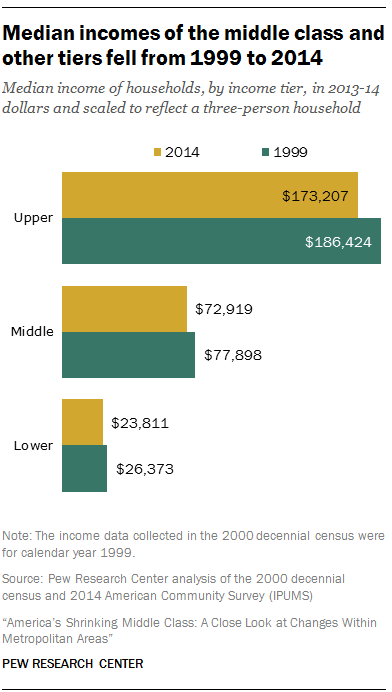For some Americans, it’s become more unlikely that they will out-earn their parents the way their parents out-earned the previous generation.
Multiple studies show that while moving up is still possible, it’s either becoming more difficult or it’s harder in the United States than in other countries.
“The probability of ending where you start has gone up, and the probability of moving up from where you start has gone down,” researcher Michael D. Carr told The Atlantic last year. The article continued:
For instance, the chance that someone starting in the bottom 10 percent would move above the 40th percentile decreased by 16 percent. The chance that someone starting in the middle of the earnings distribution would reach one of the top two earnings deciles decreased by 20 percent. Yet people who started in the seventh decile are 12 percent more likely to end up in the fifth or sixth decile—a drop in earnings—than they used to be.
And this adds to concerns about a shrinking middle class in America, caused by some people earning more and others earning less, over time.
And now, many large companies are keeping their direct employee workforce limited by outsourcing their blue-collar jobs like janitors or cooks. This keeps costs down because the corporations don't have to give those employees the same benefits — health, education, time off — that are afforded to full-time staff.
Is the deck stacked against upward mobility?
GUESTS
Elizabeth Valdivia, Security guard and former secretary in Mountain View, California; member Service Employees International Union
Aparna Mathur, Resident scholar in economic policy studies, American Enterprise Institute @aparnamath @aparnamath
Neil Irwin, Senior economics correspondent, The New York Times @NeilIrwin @aparnamath @NeilIrwin
Rick Wartzman, Author, “The End of Loyalty: The Rise and Fall of Good Jobs in America”; director, Center for a Functioning Society at The Drucker Institute of Claremont Graduate University @aparnamath @rwartzman
John Bartlett, COSTCO warehouse manager in Redmond, Washington; has worked for COSTCO for about 30 years since he was 18-years old
For more, visit http://the1a.org.
© 2017 WAMU 88.5 – American University Radio.
9(MDAxODcyMTgzMDEyMTgxMTY5NjYxN2I4OQ004))
300x250 Ad
300x250 Ad

